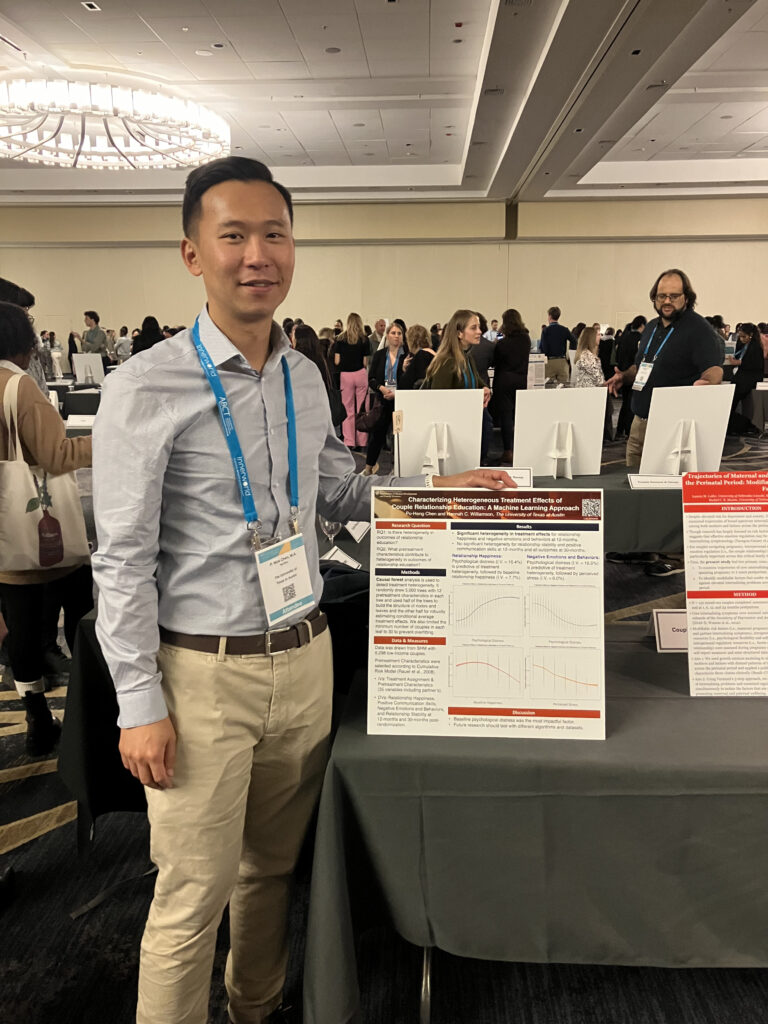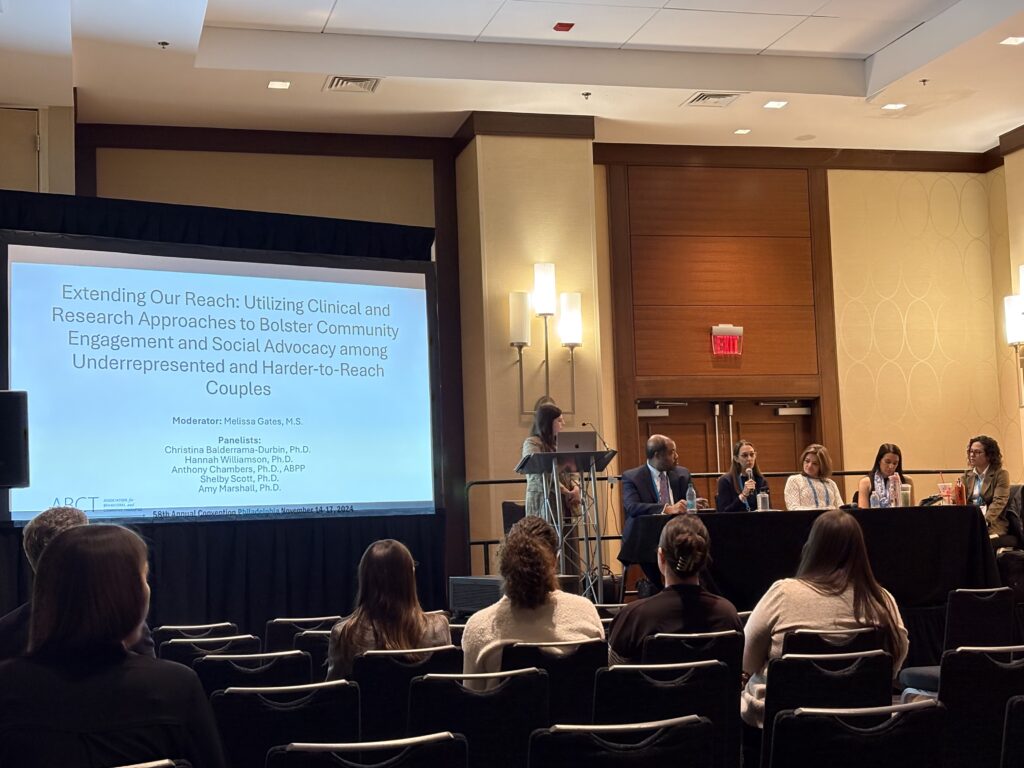Graduate student Nick Chen and Dr. Williamson have a new paper in press at Social and Personality Psychology Compass entitled “Current theories and epistemologies of couple communication center White American modes of interaction.” This article argues that observational methods that are commonly used to study couple communication are well-equipped to capture White American modes of communication and interaction which prioritize openly and directly confronting problems, but do not adequately capture the various ways that couples from other cultural backgrounds deal with relationship problems or communicate love and support. By upholding this rigid epistemological definition of “good science,” relationship scholars are limiting our ability to accurately understand relationship functioning among couples from cultural backgrounds that are not aligned with White American ideals, and perpetuating the White American mode of interaction as the “correct” way to behave in a relationship. The article then discusses adjustments that must be made to this methodology, as well as alternative methodological approaches for studying couple communication, that should be adopted in order to move toward an inclusive, global science of close relationships.
Lab News
New article in press in Journal of Social and Personal Relationships
The first article from Dr. Williamson’s collaborative work with Drs. Valor-Segura and Alonso-Ferres during her time in Spain has been published in the Journal of Social and Personal Relationships. This article presents a translation and adaptation of the widely used Perceived Responsiveness and Insensitivity Scale for use with Spanish-speaking participants. You can find the full text of the measure here.
New Chapter in press
Dr. Williamson and colleague Dr. Neff co-authored a chapter in the Handbook on Couple and Family Relationships about the role of stress in couple relationships. Despite decades of research exploring the interplay between external stressors and relationship functioning: some theoretical perspectives argue that couples’ ability to support one another and manage problems effectively buffers relationship well-being during stressful times, whereas other perspectives suggest that couples’ capacity to engage in these positive relationship behaviors deteriorates under conditions of stress. The chapter provides a brief overview of the empirical evidence supporting each of these perspectives and proposes multiple promising avenues for integrating these two seemingly contradictory views. The practical implications of these differing theoretical perspectives for interventions designed to improve relationship quality are also discussed.
NCFR Reuben Hill Award
Congratulations to Dr. Williamson and former graduate student Megan (Schouweiler) Fischer on receiving the 2024 NCFR Reuben Hill Award for their article “Household Income Differentiates Quantity and Quality of Shared Spousal Time,” which was published in the Journal of Family Psychology. This award is presented in recognition of the outstanding article, book, or monograph published in the prior year that combines theory and methodology in the analysis and interpretation of a significant family issue.
ABCT Conference presentations
Last week at the Association for Behavioral and Cognitive Therapies annual conference, graduate student Nick Chen presented part of his dissertation research, entitled “Characterizing Heterogeneous Treatment Effects of Couple Relationship Education: A Machine Learning Approach.” Additionally, Dr. Williamson participated in a panel discussion on “Extending Our Reach: Utilizing Clinical and Research Approaches to Bolster Community Engagement and Social Advocacy Among Underrepresented and Harder-to-reach Couples.”


We are recruiting undergrad students to participate in a new study

Welcoming new lab members
As the Fall 2024 semester kicks off, the Williamson Lab is excited to welcome two new lab members.

Jayda Branch is our new PhD student. She comes to us from the University of Houston where she earned a B.A. degree in Psychology.

Clare Thomas is our new postdoctoral scholar. She comes to us from the University of Georgia where she earned a PhD in Human Development and Family Science.
We are also saying good-bye to Eva Lopez, who has been a project manager in the lab for the past two years. Eva will be entering the Masters of Social Work program here at UT.
New paper in press in Journal of Family Psychology
Alongside collaborators at the University of Georgia and the University of Minnesota, the Williamson Lab has published the second in a series of articles examining the relationships of first-time Black mothers during the first 4 months postpartum. In this article, published in the Journal of Family Psychology, we explored patterns and predictors of relationship dissolution and relationship formation during the early postpartum period. We find that among mothers who were in a relationship at 1 week postpartum (N = 126), 20% of these relationships ended by Week 8 or 16. Mothers whose relationships ended reported lower relationship functioning at Week 1 than mothers whose relationships remained intact. Among mothers who were single at 1 week postpartum (N = 86), over 50% subsequently reported being in a relationship at Week 8 or 16. Mothers who started relationships reported lower overall social support at Week 1 relative to mothers who remained single. Together, these findings indicate that changes in relationship status during the early postpartum period were common and provide initial insights into factors characterizing mothers who experienced relationship transitions. Future work would benefit from considering changes in relationship status as well as other relational changes during the transition to parenthood to reflect a wider range of experiences among new parents.
Presentations at IARR
The Williamson lab will be well represented during the upcoming International Association for Relationship Research conference in Boston from July 5-8.
First, former Williamson lab post doctoral fellow Dr. Betul Urganci will be giving a talk on a collaborative project titled “Household Income Moderates Effects of Financial Strain on Relationship Quality Among African American Couples” on Sunday at 10:30am.
On Sunday afternoon at 2pm Dr. Williamson will be giving a talk about cultural biases in the study of couple communication during the Methodological Challenges in Relationship Science Symposium.
Dr. Inmaculada Valor-Segura will give a talk on collaborative research conducted during Dr. Williamson’s time as a Fulbright Scholar at the University of Granada. This talk is titled “Can positive couple relationship functioning buffer against the effects of socioeconomic status on health and well-being?” and will be on Sunday at 3:30pm.
Finally, graduate student Nick Chen will be presenting his project, titled “Examining the Role of Supportive Equity in Marital Relationships in Later Life” on Monday at 9am.
In addition, incoming PhD student Jayda Branch will be presenting her undergraduate research from the University of Houston, entitled “Examining Anxious Attachment as a Moderator between Emotional Jealousy and Psychological Abuse” during the Sunday morning poster session at 8am.
New paper in press at Journal of Social and Personal Relationships
Graduate student Nick Chen has a new first-authored publication in press at the Journal of Social and Personal Relationships. In this article we, along with collaborator Dr. Phakkanun Chittham of the Faculty of Psychology at Chulalongkorn University in Thailand, examined whether there are cross-cultural differences in the process of transformation of motivation in close relationships. Transformation of motivation occurs when one must suppress their instinct to behave in a self-focused manner in order to engage in behavior that is beneficial for their relationship. Across two studies, we found no overall differences in the extent to which U.S. and Thai individuals engage in the process of transformation of motivation, but there were cross-cultural differences in the types of pro-relationship behaviors that people from these two countries chose to engage in.


